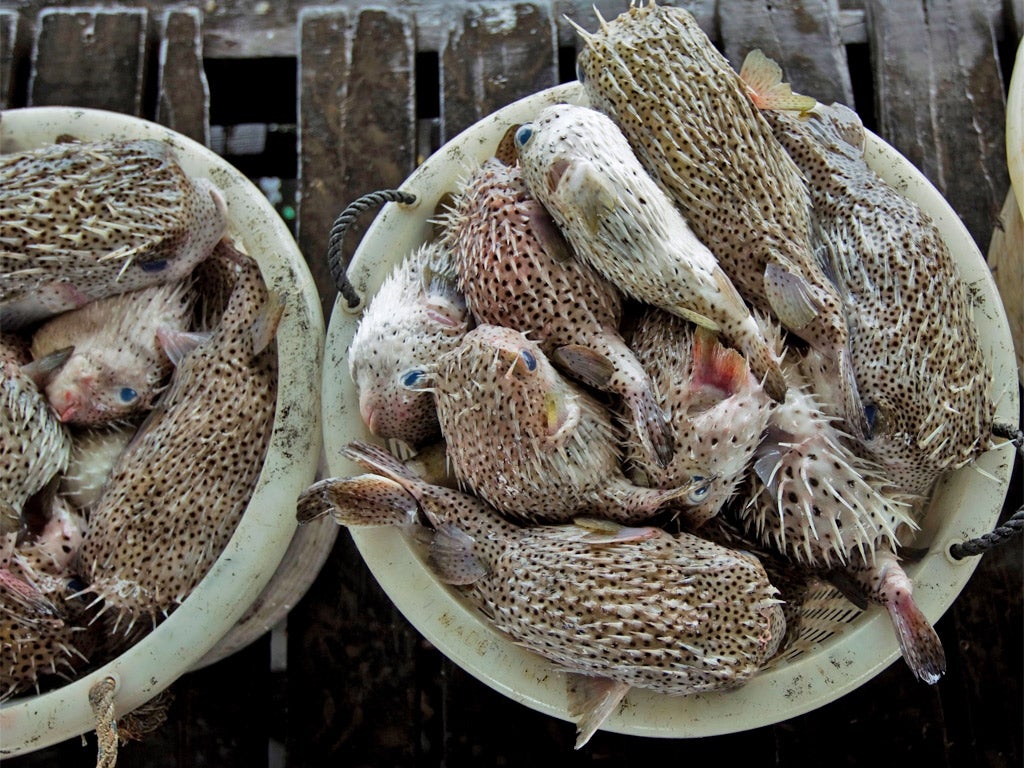Deregulating sale of blowfish 'is putting lives at risk'
Fugu's active ingredient is tetrodotoxin, a poision many times more poisonous than cyanide

Your support helps us to tell the story
From reproductive rights to climate change to Big Tech, The Independent is on the ground when the story is developing. Whether it's investigating the financials of Elon Musk's pro-Trump PAC or producing our latest documentary, 'The A Word', which shines a light on the American women fighting for reproductive rights, we know how important it is to parse out the facts from the messaging.
At such a critical moment in US history, we need reporters on the ground. Your donation allows us to keep sending journalists to speak to both sides of the story.
The Independent is trusted by Americans across the entire political spectrum. And unlike many other quality news outlets, we choose not to lock Americans out of our reporting and analysis with paywalls. We believe quality journalism should be available to everyone, paid for by those who can afford it.
Your support makes all the difference.It's ugly, expensive and poisonous enough to induce respiratory paralysis and death, but the blowfish has long been one of the more desirable items on Japanese seafood menus.
Good restaurants in central Tokyo charge nearly £100 a pop for a sashimi meal of fugu, the Japanese name for one of nature's most toxic treats.
Japanese fugu chefs are an exclusive guild, licensed to carefully gut the fish of the liver, ovaries and other parts where the poison lurks.
Now in a move that has sent some blowfish restaurants into toxic shock, Tokyo's government says it is deregulating the trade, allowing the fish to be sold in premises without a licensed chef. "Regulations no longer meet the needs of contemporary fugu distribution," sniffed an official with the government's public health bureau.
Fugu lovers have for years been bypassing the capital's licensed – and expensive – eateries by ordering from other parts of the country where the fish is freely available. The licensing system, which forces chefs to train for at least two years, is outdated and costly, say opponents.
"The strict regulations have protected Tokyo's fugu industry, and this has kept the fish's prices high," restaurant-chain owner Daichi Sakamoto told the Yomiuri newspaper.
Some Tokyo proprietors warn, however, that deregulation could backfire. "I think the government needs to be aware that people still die from eating this fish," said the proprietor of the Genpin Fugu restaurant in Tokyo's Shinjuku district. "It's very odd to take chances with lives just to save a bit of money."
Fugu's active ingredient is tetrodotoxin, a poison many times more toxic than cyanide – it reportedly induces paralysis while the victim stays wide-eyed and conscious.
Over the years, hundreds of people have died after dining on the chewy white meat. Fatalities peaked after the Second World War when starving Japanese riffled restaurant rubbish bins for food. Fugu restaurants pushed for the government licensing system, which was introduced in 1949. Since then, poisonings have fallen to the current 20 or so a year, mainly by people gutting and cooking the fish at home.
"I'll rather pay a bit extra to be safe," says Masaru Kondo, a fugu veteran.
Join our commenting forum
Join thought-provoking conversations, follow other Independent readers and see their replies
Comments